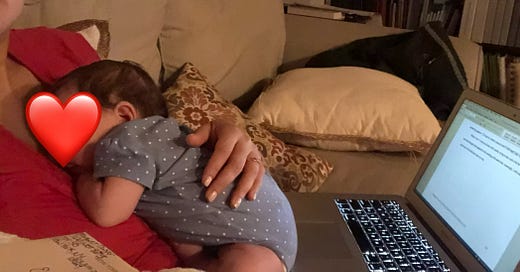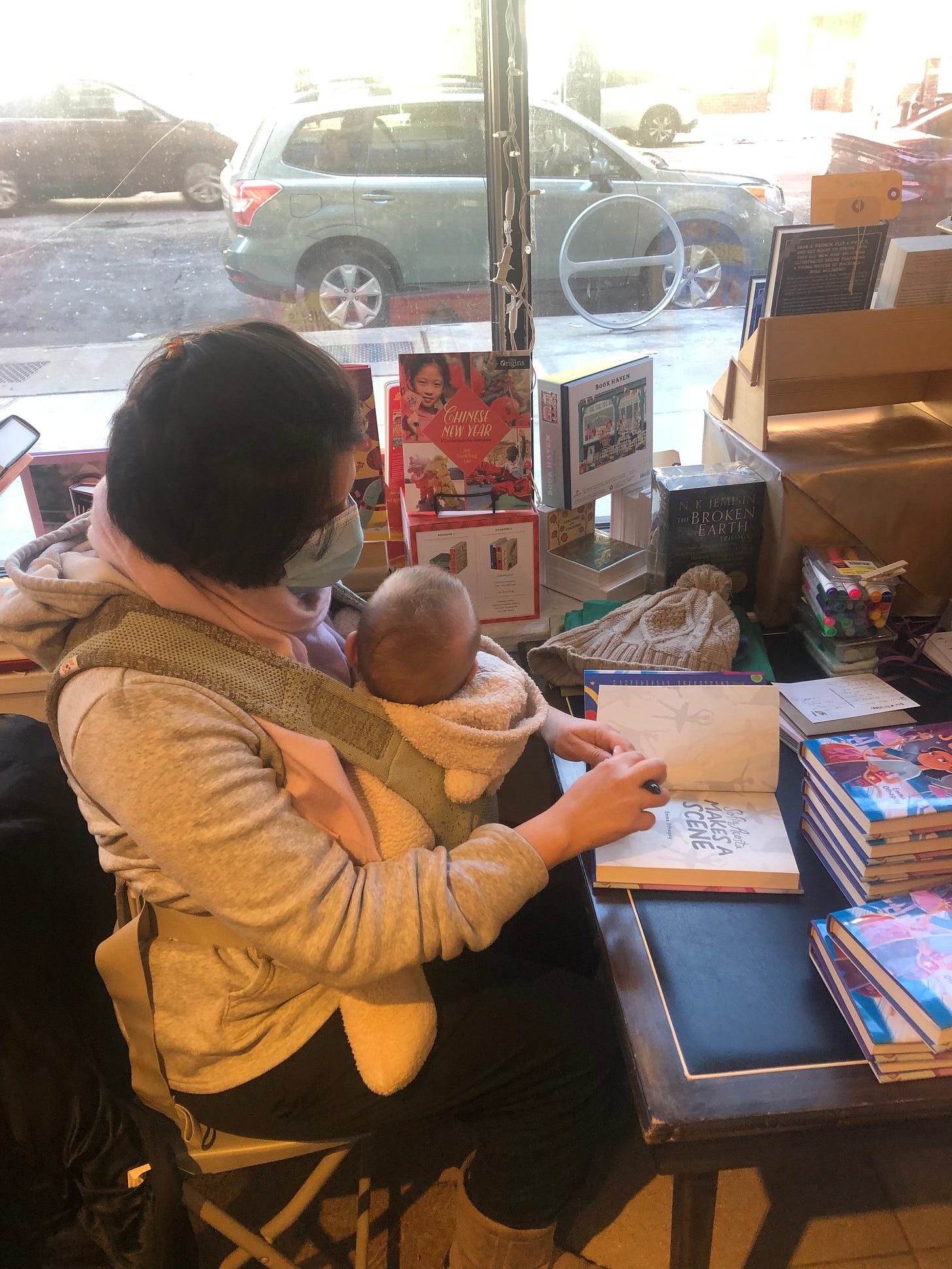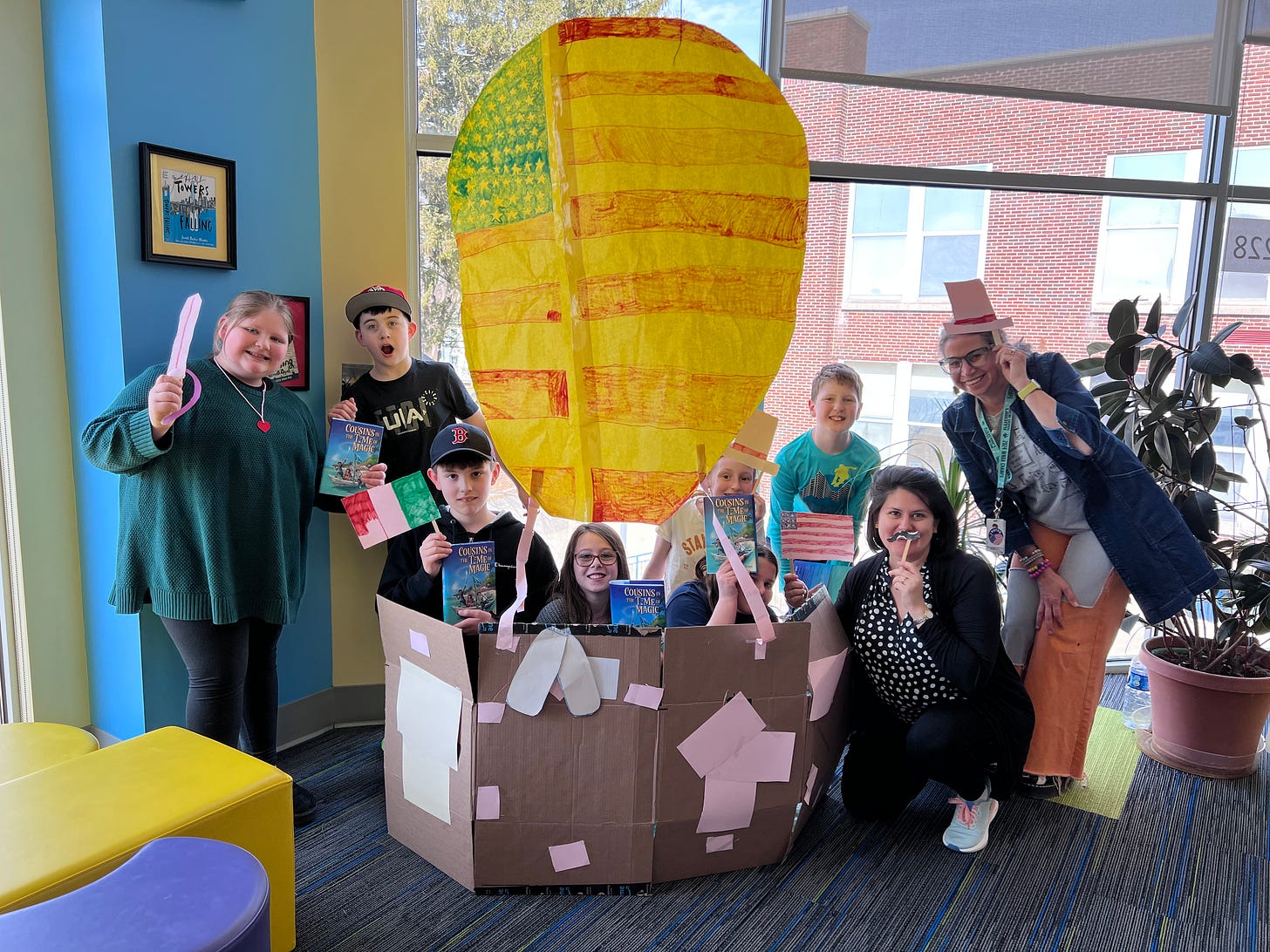I’m participating in a webinar to benefit REFORMA’S Children in Crisis on April 3rd. To support, register here!
My mother works all the time. I used to fall asleep to the sound of her typing, which she does quickly, aggressively. She had a desk in her bedroom, and when I was home sick from school I would curl up in her bed and watch her. She wore big plastic computer glasses and thin gold bangles. She talked under her breath and scribbled notes in perfect penmanship, a notable contrast to her desk, which was a mess.
It has always made sense to me that working would be mixed-up with parenting. I wrote most of my second novel, Sofía Acosta Makes a Scene, when I was pregnant with Alaya. I finished the manuscript while she slept in a baby carrier as a newborn. I had an easy birth and she was a small baby; it was warm and pleasant.
By the time Sofía Acosta Makes a Scene was in galleys I had already given birth to Felo–a bigger baby and a harder birth. I bought a more structured baby carrier and reviewed the galleys while Tim took Alaya to the playground.
The book was published in the middle of the Omicron, and there was very little I could do to promote it. Still, the folks at Astoria Bookshop asked me to sign stock, so I put Felo in the carrier and went. The bookseller insisted on taking photos and I thought “Who wants a photo of a postpartum woman in a surgical mask?” but I am so grateful for that photo, and maybe someday Felo will be too. I am even more grateful that there were loving human beings there to receive me on that day.
I now have confirmation that my books, my mother’s books, and the books of almost every writer I hold dear were pirated for AI training. The Atlantic released a galling article describing Meta’s use of a pirated books database called LibGen. The article (gift link) reveals that published books were indispensable for training AI, and that after discussing the possibility of acquiring licenses to those books, Meta decided to just use pirated versions.
In short: Zuckerberg and his employees knew full well that they were breaking the law when they used pirated books. They knew, as the saying goes, that piracy is theft. They chose to steal.
They chose to steal to train a machine that makes writing look effortless, the smooth and glossy operations of a computer.
But like all creation, writing is embodied, messy, and uphill: it involves sore backs, sitting in puddles of lochia, and children in bed with vomit bowls.
Without struggle, it wouldn’t mean anything at all when kids read my writing. They wouldn’t come running up to me at school visits as if they already knew me. I give something of myself to them when I write a book; the giving is the whole point.
My father, from whom forty-six papers were pirated, likes to quote the Spanish philosopher Ortega y Gasset, who said a century ago that the modern “hombre masa” thinks that technology is like the sun and the air–there for the taking, natural and not fabricated. My father encouraged us to be more than the hombre masa, to understand that the conveniences we enjoy and the media we consume are the result of precious human labor.
In our moment, it takes concentration to see human labor at all. Zuckerberg, Musk, and Bezos, to name a few, are deeply invested in our inattention and in making labor invisible to us.
They would like us to be like the hombre masa, to believe that AI writing happened in a way that was inevitable, natural, and immaculate. After all, you wouldn’t point fingers if your papers were swept up in a deluge.
But LibGen is neither sun, air, nor flood. Piracy doesn’t happen without human intention. The thieves are squarely to blame.
And for all the fear-mongering that human labor is on the brink of becoming obsolete, this stealing makes evident that all technology is the fruit of human work.
They want our toil—and their theft—to be invisible; my father taught me to see.
Alaya and Felo, the babies I gestated and birthed and cared for with the same body I wrote my books, are now old enough to watch and observe themselves. With their eyes, ears, and minds, which is to say with their bodies, I want them to feel that whether it’s publishing a book or changing the bedsheets yet again, love is all work, and work is how people love.
Now that they are learning their letters, I want them to experience how writing can give you a voice when you feel small. How writing lets you get a word in edgewise when everyone is shouting over you. That there is no product that can replace the gift of learning to say what you mean and to express your ideas precisely.
I want them to see the work of writing happen, to know that writing is created by humans who sweat and sacrifice and suffer, and that labor is not an inconvenience, a line item to be wished (or stolen) away, but precisely the reason that writing matters.
On April 3rd I will be participating in a webinar to benefit REFORMA’S Children in Crisis. I’ll be in conversation with Cousins in the Time of Magic illustrator Poly Bernatene for a behind-the-scenes peek at the making of the book. Poly is an instantly engaging conversationalist, and I am in awe of his artistic instincts. I hope you will join us on April 3rd so you can meet him yourself.
The webinar is organized by REFORMA, The National Association to Promote Library and Information Services to Latinos and the Spanish Speaking, and all the proceeds from registration and book sales will go to the REFORMA Children in Crisis project. This project provides books to asylum-seeking children. They partner with traditional shelters, grassroots organizers, and religious groups including Jewish Family Services and Catholic Charities to make books available wherever there are arriving children. As the proud child of refugee immigrants I could not be happier to support them, and I hope you will too. The registration is only $10, with an additional opportunity to buy an extra-special signed book, also to benefit Children in Crisis.
Please join us, and spread the word widely to anyone you know who might want to attend! All are welcome.
Thank you, thank you, thank you for all of your pre-orders, and for attending the in-person book party! Cousins in the Time of Magic has launched with great love and success. Here is a treasured photo from a school visit: this fifth-grade book club built the hydrogen balloon from the book for their school library, complete with photo booth props like a mustache—they even made a play telegram transmitter!
Can you forward this newsletter to a friend?
Most of my readers find me through friends and family who have recommended me. If you can forward this email to someone who loves kidlit, I would be honored. ¡Mil gracias!









